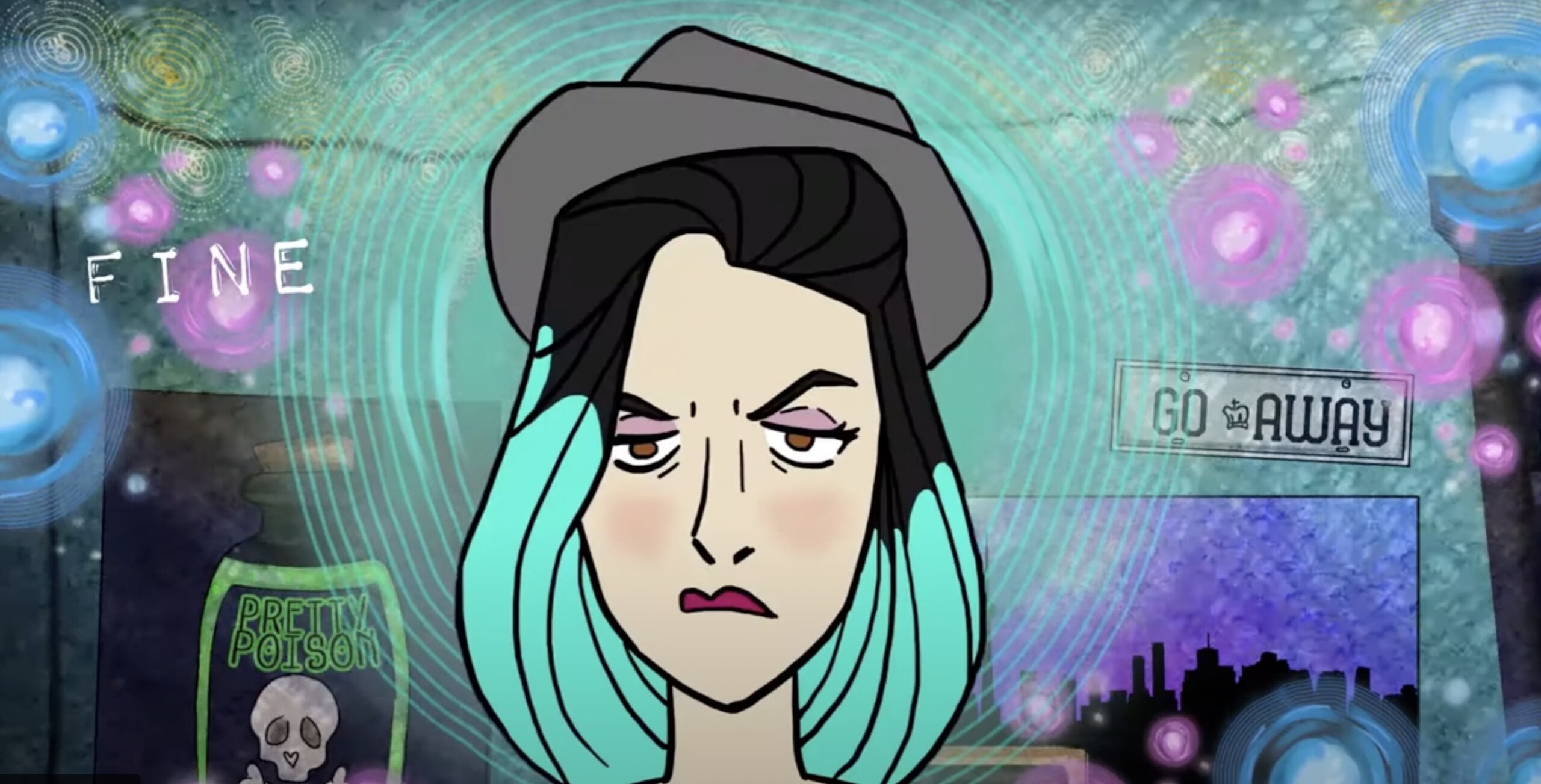It is 1997 and you are a queer goth teen with an abusive father.
“So much of the game, the concept of it crystallized as, ‘What if I could curse him as he curses me?’” Emily Flynn-Jones says in an interview. She is the writer and designer of Curses, a point-and-click adventure game from Ontario-based indie studio Killjoy Games. The semi-autobiographical game is rooted in her own experiences.
In Curses, you play as Girl, a 16-year-old in 1997 with a love of sci-fi TV, riot grrl music and practical magic. The adventure takes place in real-time, as Girl dreams of casting a curse on her abusive father. Girl and her talking cat Familiar pace her room, practising her craft and pondering her emotions as she decides whether to cast a spell for healing or hurt.
“We do not take teenage narratives seriously, particularly those of a teenage girl,” Flynn-Jones says over the phone from her home in Brantford, Ontario. “Woe betide teenage girls for having feelings, specifically the wrong kind, or too much of them.”
At various points in the game, you’re asked to choose from one of five core emotions to convey how Girl is feeling: anger, determination, envy, sadness and uncertainty. Each one has distinct dialogue and interactions, leading up to 10 possible endings. Curses asks you to sit in big, complicated sentiments and understand Girl’s reasons for feeling each way, even if her reactions might not be the kinds of things you’re supposed to say out loud. When Girl is angry, she dreams of harm; when she’s sad, she wants to not be alive. There’s no filter or attempts to blunt the sharp edges of her emotions.
“I wanted everything to be grounded in Girl’s feelings and make those valid,” Flynn-Jones says. “Even if some of those lead to ethically or morally dubious kinds of ideation and potential actions in the game, I want to be non-judgmental about that.”
That non-judgmental attitude is shared by Familiar. He embodies feline capriciousness—sometimes jostling for chaos, sometimes making fun of Girl, sometimes expressing concern—but also acts as a good listener. He’s the one who asks Girl to reflect on how she’s feeling, letting her swap between different emotions depending on where she’s at in her internal journey. He also helps Girl with her magic. The first mini-game is anthropomancy, the study of entrails to divine future—and it’s Familiar who rips apart Girl’s childhood cuddly toy and encourages her to scour the fluff inside for meaning.
Girl’s dad is the reason for her struggles, but he never shows up in person: it’s just Girl and Familiar, working their way through things together.
“I very intentionally did not want the father or any of the family to have any representation,” Flynn-Jones says. “They are catalysts for all this, but they don’t get any of the narrative … even when you’re doing magics that involve them, they don’t get to be present.”
Girl’s queerness is apparent, but understated. If you try to go into her closet, she scoffs at you. “I’m not totally out of the closet. Don’t need to go back in,” she says. That’s a nod to coming out as a fluid process, too: Girl is out to herself, if not to everyone. She loves both Mulder and Scully from The X-Files, but the game isn’t really about queerness in a romantic way. Rather, Curses considers queer as a verb—queering magic, systems, expectations.
Flynn-Jones says part of the queerness of magic is in its fluidity. “There’s no right way to do it. It’s not a school of rules, or it doesn’t feel that way.” The lack of adherence to a strict code means that her relationship to magic feels somewhat analogous to her relationship to queerness. “It’s discovery, and flexibility that I didn’t think or feel were possibile when I was stuck in the whole compulsory ‘het set.’”
Letting rules be flexible means that Girl gets to perform magic in whatever way works for her. She uses magic to gain clarity into her own thoughts, feelings and wishes, finding ways to control something that otherwise feels chaotic. The methods used are very individual.
“There’s a lot of DIY magic in here, which is a part of queering your craft or things that oppressed people bring into their magic,” Flynn-Jones says. For example, she points out that the symbols in tarot don’t resonate with lots of people—Girl included. “How is she going to have the strongest possible connection to these things?”
The answer is by making them herself. Girl’s tarot deck, lovingly drawn by artist Kas Millard (and drawn in-universe by Girl herself), depicts Buffy the Vampire Slayer and The Lost Boys, alongside David Bowie and Greek mythology.
One of the game’s biggest delights is how it interacts with pop culture. It’s full of nods to the media Flynn-Jones loved as a teen. Girl tells Familiar about the melodrama of The Virgin Suicides, and has a strong distate for Bill and Ted’s Excellent Adventure. You can peruse Alice’s Adventures in Wonderland or have a seance with the ghost of Mary Shelley—nods to Flynn-Jones’s older favourites.
Curses goes beyond using references for nostalgic flavour, though. Pop culture is a lens: it’s part of how Girl understands the world, which makes it part of how she understands herself.
“When you’re a teen, you consume so much. That’s part of your identity-building,” Flynn-Jones says. “It’s such a relief to find resonance and companionship [in media] when you are lonely and isolated.”
For some people, Curses might end up doing that same thing. While it is drawn from Flynn-Jones’s own personal experience, the specificity gives it an emotional weight.
“It’s not going to mean everything to everyone. But it’s going to mean something to someone specific, and I think that’s much more powerful.”
Curses is available now on Steam and itch.io for $7.99 CAD.


 Why you can trust Xtra
Why you can trust Xtra


